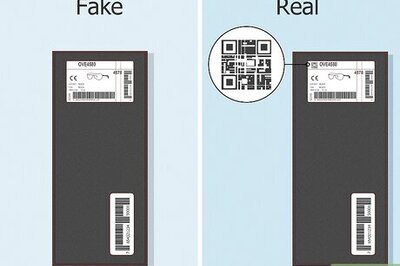
views
The U.S. Supreme Court on Friday agreed to hear a bid by Arizona Republicans to enforce two voting restrictions in the state that were struck down by a lower court as disproportionately burdening Black, Hispanic and Native American voters.
At issue in the case are Arizona measures that prohibit absentee ballot collection by third parties and the counting of ballots cast at the wrong polling precinct. The justices will hear the Republican-backed appeals of a January ruling by the San Francisco-based 9th U.S. Circuit Court of Appeals invalidating the provisions as violations of the Voting Rights Act, a 1965 U.S. law that barred racial discrimination in voting.
The restrictions will remain in effect for the Nov. 3 presidential election because the 9th Circuit put its ruling on hold pending the state’s appeal to the Supreme Court.
The Arizona dispute involves a Republican-backed 2016 state law that made it a crime to hand someone else’s completed early ballot to election officials, with the exception of family members or caregivers. Community activists sometimes engage in such ballot collection to facilitate voting and increase voter turnout. Critics call the practice ballot harvesting.
Ballot collection is legal in most states, with varying limitations. Twenty-six states allow voters to designate someone to return their ballot for them, 10 allow family members to do so, while the rest require voters to return their own ballot or are silent on the issue.
The case also involves a longstanding state policy that discards provisional ballots cast in-person at a precinct other than the one to which a voter has been assigned. In some places, a voter’s precinct is not the closest precinct to their home. Provisional ballots are those cast when a voter does not appear on that precinct’s voter rolls.
Nearly 30,000 out-of-precinct ballots were tossed out during the 2008, 2012 and 2016 presidential elections in Arizona, court filings said.
The Democratic National Committee and the Arizona Democratic Party sued the state’s Republican officials in 2016 over the provisions.
The 9th Circuit ruled that both Arizona voting measures had a discriminatory impact on racial minorities in violation of the Voting Rights Act. The 9th Circuit further found that the ballot collection prohibition violated the U.S. Constitution’s 15th Amendment, which prohibits racial discrimination in voting, noting that “false, race-based claims of ballot collection fraud” were used to convince Arizona legislators to pass the law.
The state and its Republican Attorney General Mark Brnovich appealed to the Supreme Court. The Arizona Republican Party also appealed.
The case, which began in 2016, is part of a wave of voting-related litigation ahead of the November election in which President Donald Trump is seeking a second term.
It touches upon issues including voting by mail that Trump has seized upon in his attacks on the integrity of the election. He and some fellow Republicans have asserted, without evidence, that a surge in mail-in voting amid the coronavirus pandemic will lead to election fraud, which is exceptionally rare in the United States.
The court took action in the case three days before it begins its new nine-month term short one justice after the Sept. 18 death of Ruth Bader Ginsburg. President Donald Trump has nominated federal appeals court judge Amy Coney Barrett to replace Ginsburg.
Disclaimer: This post has been auto-published from an agency feed without any modifications to the text and has not been reviewed by an editor


















Comments
0 comment